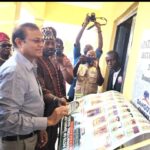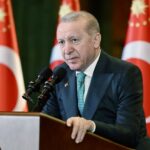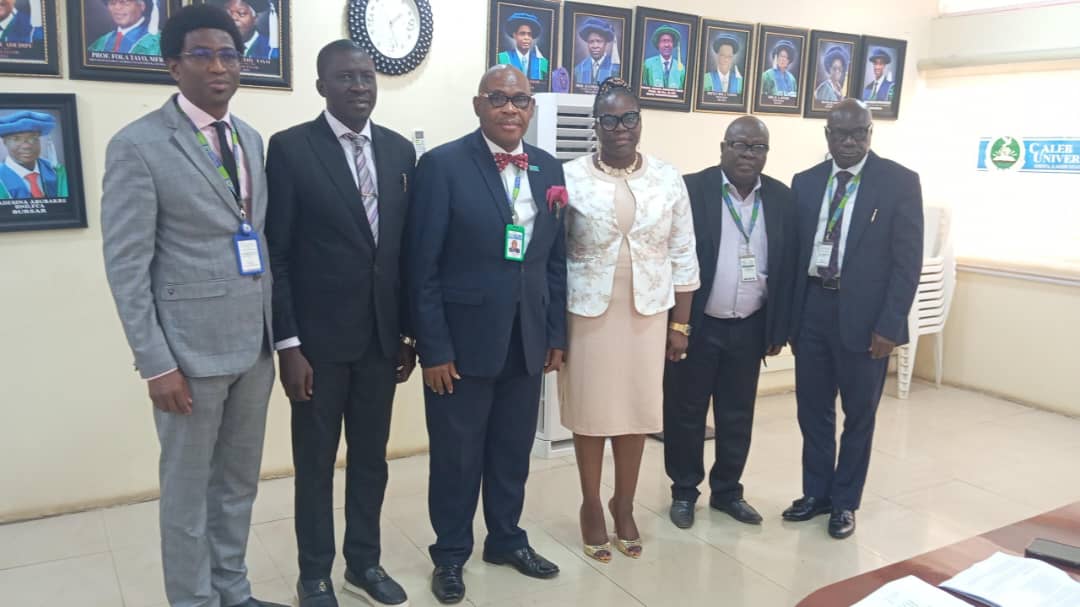By Oluwaseun Nubi/Henry Oladele
Prof. Olalekan Asikhia, the Vice-Chancellor of Caleb University, Imota, Lagos State, on Wednesday unveiled a seven-point vision designed to reposition the institution as a centre of academic excellence and innovation.
Speaking at a news conference, held at the university’s council chamber, Asikhia emphasised that his administration’s blueprint was built around crafting a godly environment, driving academic excellence, and strengthening global partnerships.
“We want to ensure that Caleb University is run on godly principles and continues to raise students who are becoming more and more like Jesus in every way,” the Vice-Chancellor said.
He explained that the new administration would decentralise services, promote student-led chapel activities, and instil discipline through mentorship rather than compulsion.
On academic excellence, the Vice-Chancellor said the university had introduced the Caleb Academic Potentialisation Scheme (CAPS) to support students with low Cumulative Grade Point Average (CGPA) through tutorials and mentorship programmes.
“We also established a citizenship committee to tackle absenteeism and unseriousness among students to enhance the delivery of excellence,” he said.
He recalled that Caleb University recently emerged first in a national moot court competition before representing Nigeria in South Africa.
He described the feat as a testimony to the university’s growing academic strength.
Asikhia also announced a digitalised student management system designed to ease campus operations, allowing students to make food orders and submit exit requests online.
He stated that the university was integrating Artificial Intelligence (AI) and modern technology into its curriculum to prepare students for a rapidly changing world.
“AI is no longer the future, it is the present.
“We must teach our students how to use it responsibly, especially in research and communication. At Caleb, we will ensure AI supports learning, not shortcut it,” he said.
He condemned examination malpractices, warning that the institution would continue to uphold zero tolerance for academic misconduct.
“There is no shortcut to success.We will not compromise integrity for grades. Every student must earn their achievements through hard work,” he said.
On research and innovation, Asikhia said the university was committed to becoming number one in Nigeria and among the top 20 in Africa by 2030 in global ranking, and in impact ranking by 2027.
He disclosed that 11 centres of excellence had been established to drive innovation and industrial problem-solving.
“We are promoting a culture where every lecturer and student become innovation conscious.We are living innovatively, ensuring new things constantly emerge from our environment,” he said.
Speaking on international linkages, Asikhia said Caleb University had created a Centre for Global Engagement, Industry and Government Partnerships to coordinate relationships with leading institutions worldwide.
He said the institution had existing collaborations with the University of North Carolina (U.S.); University of KwaZulu-Natal (South Africa); Kenyatta University (Kenya); and the University of London (UK).
He added that talks were ongoing with Cambridge, Oxford, and Harvard universities for staff and student exchange programmes.
On entrepreneurship, Asikhia said the institution was committed to producing graduates who would become job creators rather than job seekers.
“We are encouraging students to register their companies while still on campus and start operating their businesses before graduation,” he said.
He added that the university was developing a robust endowment and investment strategy to ensure financial sustainability, while commercialising its research outputs.
On institutional governance, he said the university had already developed a strategic plan with frameworks for performance monitoring and decentralised decision-making.
“Every lecturer is expected to publish at least four Scopus-indexed papers yearly to improve our world ranking,” Asikhia said.
He also reaffirmed his commitment to climate action and environmental sustainability, announcing the creation of a Green Student Council to drive eco-friendly initiatives on campus.
“We want to ensure our waste becomes wealth and that our environment remains green, clean, and conducive for learning,” he said.
Asikhia pledged improved welfare, better hostel management, and infrastructural upgrades, including expansion of the library and ICT facilities.
He assured that the university would sustain open communication with all stakeholders to ensure harmony and progress.
“This administration believes in accountability and teamwork. We will continue to engage our staff and students because governance in the 21st century must be participatory,” he said.
Asikhia commended the media for its continued partnership in promoting responsible journalism and shaping public perception.
“Through your reports and analysis, you help communicate our mission, correct misconceptions, and celebrate our achievements. We consider you partners in national development,” he added.(NAN)(www.nannews.ng)
Edited by Folasade Adeniran












